Session Three - Israel - from Judges to a Divided Kingdom
Introduction
This lesson covers a lengthy period in Old Testament history. Picking up from the death of Joshua, who led the children of Israel into the Promised Land, it is filled with stories of heroes, kings, intrigues, betrayals, villains, battles, prophets and exile. What happened to them occurred a long time ago, but the accounts contain valuable lessons for us. Deep down, people have not changed very much during the intervening centuries.
The book of Joshua (24:31) concludes with the following assessment:
The people of Israel served the LORD1 throughout the lifetime of Joshua and of the elders who outlived him - those who had personally experienced all that the LORD had done for Israel (24:31).
1 Thus formatted, LORD is a convention used in versions of the Old Testament to name Him without using Jehovah/Yahweh, so that no one would misuse His revealed name, even unintentionally.
Compare this with commentary in Judges (the next book), after a period of growth, consolidation as individual tribes and mixing with remnants of the original inhabitants:
After that generation died, another generation grew up who did not acknowledge the LORD or remember the mighty things he had done for Israel. The Israelites did evil in the LORD's sight and served the images of Baal. They abandoned the LORD, the God of their ancestors, who had brought them out of Egypt. They went after other gods, worshiping the gods of the people around them. And they angered the LORD. They abandoned the LORD to serve Baal and the images of Ashtoreth. This made the LORD burn with anger against Israel, so he handed them over to raiders who stole their possessions. He turned them over to their enemies all around, and they were no longer able to resist them. Every time Israel went out to battle, the LORD fought against them, causing them to be defeated, just as he had warned. And the people were in great distress. Then the LORD raised up judges to rescue the Israelites from their attackers. Yet Israel did not listen to the judges but prostituted themselves by worshiping other gods. How quickly they turned away from the path of their ancestors, who had walked in obedience to the LORD's commands. (2:10-17).
Judges
The book of Judges depicts the life of Israel in the Promised Land - some 300 years from the death of Joshua (1:1) to just before the rise of the monarchy. It tells of appeals to God in times of crisis and sin, moving God to raise up leaders (judges) through whom He throws off oppressors and restores the land to peace.
The text of Judges gives no indication as to who wrote the book, but Jewish tradition names the prophet Samuel as the author. Samuel was the last of the judges, one of the special leaders whom God raised up during this time period to rescue His people. The judges did not oversee merely legal matters, as in our understanding of the role; their tasks often included military and administrative authority as well.
Major events: leadership of the Israelites by the judges; Israel's sins and God's deliverances; conflicts between the tribes.
Key ideas: God's justice and grace; God's provision of deliverers; the work of the Holy Spirit; choices the people made between pleasing God and backsliding.
The times of the judges witnessed great sin in Israel. The nation underwent political and religious turmoil as the people tried to possess those parts of the land that had not yet been fully conquered (or lost the heart to complete the work). The tribes fought among themselves. There was no apparent leadership or civil authority for the nation.
The pattern of behaviour in Judges is clear: the people rebelled through idolatry and disbelief, God brought judgment through external oppression, God raised up a deliverer—or judge, and the people repented and turned back to God (see Judges 2:14-16).
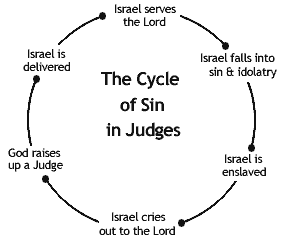
When the people fell back into sin, the cycle started over again. In the end:
Whenever the LORD raised up a judge over Israel, he was with that judge and rescued the people from their enemies throughout the judge's lifetime.
For the LORD took pity on his people, who were burdened by oppression and suffering. But when the judge died, the people returned to ways even more corrupt than those of their ancestors, following other gods and serving and worshiping them. They refused to give up their evil practices and stubborn ways. Therefore, the Lord was very angry with Israel and said, "Because this nation has violated the covenant I ordained for their ancestors and has not listened to me, I will no longer drive out before them any of the nations Joshua left when he died. I will use them to test Israel and see whether they will keep the way of the Lord and walk in it as their ancestors did." (2:18-22).
In Judges book we meet many heroes of faith: Othniel, Gideon, Samson, Shamgar, Deborah, Jephthah and Ehud (cf Hebrews 11:32).
Samson - a Case Study
Samson's incredible exploits, as related in the biblical narrative, hint at the weight of Philistine pressure on Israel during much of Israel's early, tribal period in Canaan (1200-1000 BC). The biblical narrative refers to Samson's "twenty years" activity as a judge and presents a few stories, principally concerned with the beginning and the end of his work. Before his conception, his mother, a peasant of the tribe of Dan at Zorah, near Jerusalem, was visited by an angel who told her that her son was to be a lifelong Nazirite - dedicated to the special service of God, usually through a vow of abstinence from strong drink, from shaving or cutting his hair, and from contact with a dead body.
Samson possessed extraordinary physical strength, and his saga eventually relates the disastrous loss of his power to his violation of the Nazirite vow, to which he was bound to serve God. He first broke his religious obligations in his relationship with a woman from the neighbouring town of Timnah, who was a Philistine, one of Israel's enemies. Other remarkable deeds followed. Samson decimated the Philistines. On one occasion he repulsed an assault on him at Gaza, where he had gone to visit a prostitute. Samson finally fell victim through his love for Delilah, who beguiled him into revealing the secret of his strength: his long hair. As he slept, Delilah had his hair cut and betrayed him. He was captured, blinded, and enslaved by the Philistines, but in the end God granted Samson his revenge; with the return of his old strength (as his hair re-grew) and his relationship with God, he demolished the great Philistine temple of the god Dagon, at Gaza, destroying his captors and himself (Judges 16:4-30).
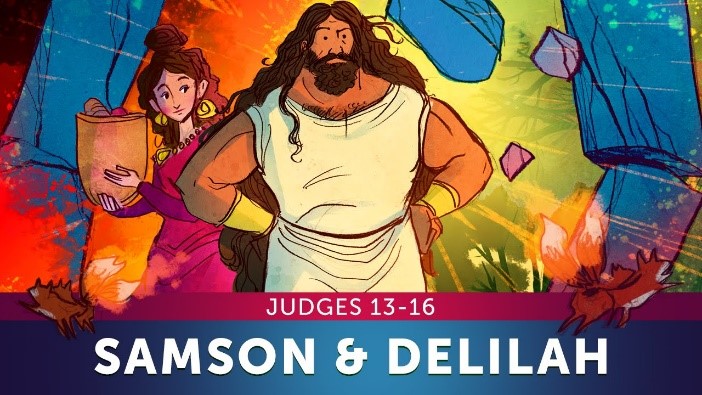
Hollywood depicts Samson
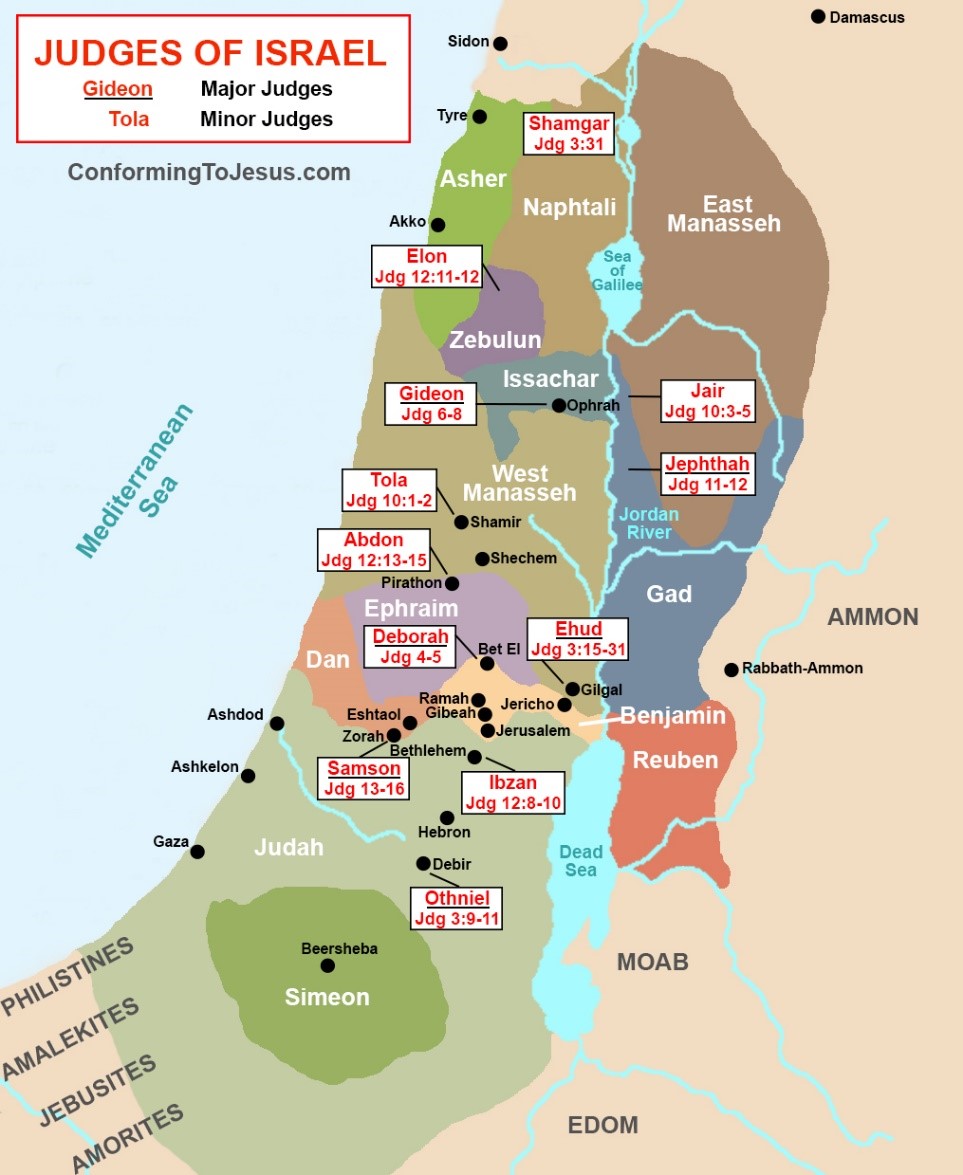
The judges served different tribes & territories.
The book of Judges concludes soberly:
In those days Israel had no king; all the people did whatever seemed right in their own eyes (Judges 21:25).
The people eventually rejected the idea of theocracy (rule by God, through judges, Samuel and the priests), but their inability to resist sinful Canaanite influences revealed their desire for a centralized monarchy, led by a king whom (Samuel trusted) God would choose as His intermediary. The first of these was Saul, from the tribe of Benjamin.
More on that shortly, but first a brief account from some time during the period of the judges: the story of Ruth.
Ruth
The book of Ruth has been called one of the best examples of short narrative ever written. It presents an account of the remnant of true faith and piety in the period of the judges through the fall and restoration of Naomi and her "foreign" daughter-in-law Ruth.
Major events: Naomi and her husband live in Moab; famine; the menfolk die; Ruth and Naomi (one of her daughters-in-law) return to Bethlehem. Ruth and Boaz meet and are married; their descendants are King David and Jesus Christ.
Key ideas: tragedies occur in the human story, but God always has a plan; when God's people are faithful to Him, God is also faithful. The OT idea of a kinsman-redeemer - more about that later.
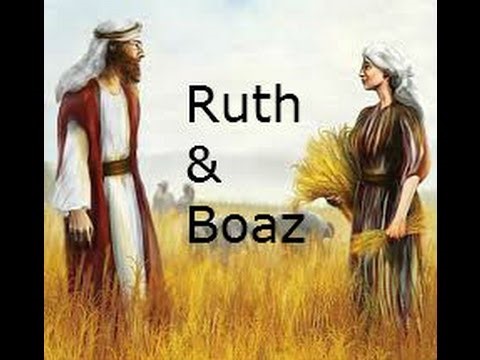
Ruth was a Moabite woman, who married Mahlon, an Israelite (Ruth 4:10). According to biblical tradition, Moabites came from the act of incest between Lot and his older daughter (Genesis 19:30-38), so the whole nation was tainted and considered inferior to Israel. There was frequent warfare between the two groups, yet they were normally close and often intermarried.
Mahlon's parents - Elimelech and Naomi - and their two sons moved to Moab, about 40 miles east of Bethlehem, to survive a famine in Israel. While they were living there, tragedy struck. Elimelech and his two sons, died for reasons not disclosed to us. Naomi (Elimelech's widow) eventually decided to return to Bethlehem. She presumed that her daughters-in-law Ruth (Mahlon's widow) and Orpah (Chilion's widow) would not want to return to Bethlehem but would return to their people and re-marry. Orpah returned to her people and the Moabite way of life, but Ruth could not be persuaded. It was during this conversation that Ruth, who chose to stay with Naomi, made the famous speech of loyalty to her mother-in-law which has become the basis for many Christian wedding vows (Ruth 1:16-17).
Naomi returned to Bethlehem with Ruth and through her wise mediation Ruth married her late husband's relative Boaz and bore a son who became the grandfather to King David of Israel. She is one of four women listed in the genealogy of Jesus Christ in Matthew 1:2-17.
1 & 2 Samuel
Major events: the call of Samuel; his prophetic ministry based in Shiloh; establishment of the kingdom; Saul, Jonathan, David. Israel's dealings with its enemies (including the Philistines). The national capital relocated to Jerusalem, along with the Ark of the Covenant.
Key ideas: the characters of key individuals, in particular Samuel, Saul and David. God's call in David's life. Goliath and the Philistines. David's sin and repentance. The importance of the Ark of the Covenant (located in Shiloh) in the religious life of Israel and their relationship with God.
The books of Samuel relate God's establishment of a new system headed by a king. Through Samuel's life, we see the rise of the monarchy and the tragedy of Saul's life. These books contain histories; the stories are partial, they are not meant to be complete histories. After the failure and death of Saul, 2 Samuel depicts David as a true representative of an ideal king. Under David (and a kingdom finally reunited) God caused the nation to prosper, to defeat its enemies, and to realize the fulfillment of His promises. David sins are described, as well as the civil war led by his son Absalom.
1 & 2 Kings (originally one book, but divided in the Greek Septuagint)
1 Kings continues the account of the monarchy in Israel and God's involvement through the prophets. After the death of David, and a short struggle over the succession, David's son Solomon ascended the throne of a powerful and influential united kingdom, a Golden Age, but this unity only lasted during his reign. Accounts of various good and evil kings follow. The book explores how each subsequent king in Israel and Judah answered God's call - or, as often happens, failed to listen. 2 Kings takes the historical account of Judah and Israel forward. The kings of each nation are judged in light of their obedience to the covenant with God. Ultimately, most of the people from both nations are exiled for disobedience.
Major events: Solomon accedes to the throne; his wisdom and reign; building of the temple; the Queen of Sheba; the kingdom divided; worship of false gods, including Baal, Ashtoreth, Moloch, Golden Calf cult (1 Kings 12); the ministries of key prophets, in particular Elijah (who performed 8 miracles) and Elisha (who performed 16 miracles), but also Nathan, Jonah, Isaiah and others; ongoing military conflicts (Israel: 925-722 BC; and Judah: 925-586BC); the Assyrian exile of Israel (722BC) and the Babylonian exile of Judah (586BC). We will cover the exile and return in greater depth in a future lesson.
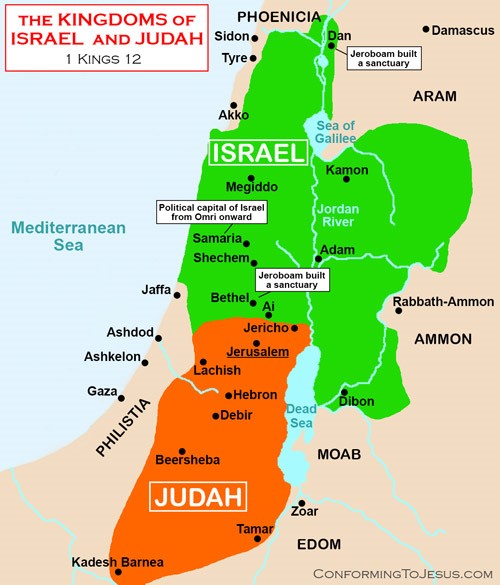
The divided kingdom.
Key ideas: God can use charismatic leadership, but leaders can fall into sin; God can call a nation out of slavery to be His people, but they can break the covenant (agreement); this can occur in just one generation that forgets, rejects or neglects God.
Hezekiah (715 and 686 BC) is considered a righteous king by the author of the Books of Kings; he is one of the kings mentioned in the genealogy of Jesus in the Gospel of Matthew. Hezekiah witnessed the destruction of the northern Kingdom of Israel by Sargon's Assyrians in 722 BC and was king of Judah during the siege of Jerusalem by Sennacherib in 701 BC. Hezekiah enacted sweeping religious reforms, including a strict mandate for the sole worship of God and a prohibition on venerating other deities within the Temple of Jerusalem. Isaiah and Micah prophesied during his reign.
1 & 2 Chronicles (originally one book, but divided in the Greek Septuagint)
Just as the author of Kings had organized and interpreted Israel's history to address the needs of the exiled community, so the writer of 1 & 2 Chronicles wrote another history for community who had returned from exile. 1 Chronicles contains a lot of family histories.
Major events: Re-tells the past to inspire hope in the present. Priests and Levites become community leaders. Temple worship strengthened. Sin in the nations of Israel and Judah.
Key ideas: worship in the Old Testament; God's presence is more important than a king's presence; obedience to God is more important than political power and national status. The power of conversion: the life of King Manasseh (2 Chronicles 33:11-13).
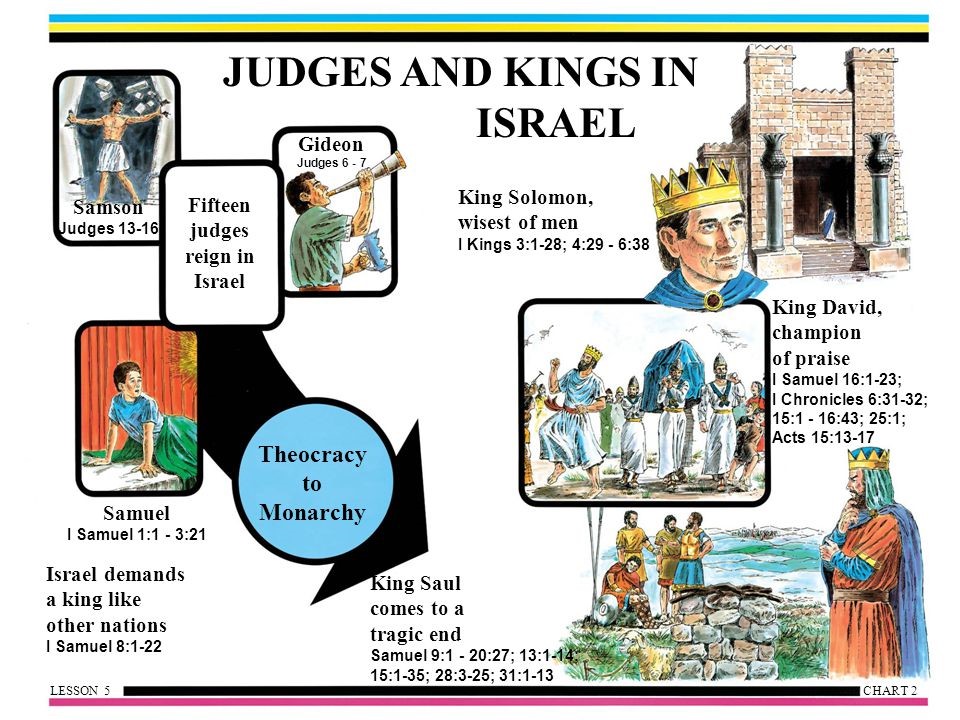
Sin in Israel led to the emergence of the Old Testament prophets. The most famous we encounter at this time is Samuel, a young boy "given" to the Lord by his parents, who grows up to lead the nation until the first king, Saul. Two kings need special attention.
1. David
David was the youngest son of Jesse and a shepherd. He began his career as an aide at the court of Saul, Israel's first king. He distinguished himself as a warrior against the Philistines (starting with Goliath) but his popularity aroused Saul's jealousy, and a plot was made to kill him. David fled into southern Judah and Philistia, on the coastal plain of Palestine. As an outlaw with a price on his head, David led the life of a Robin Hood on the frontier of Judah. He became the leader of a group of other outlaws and refugees, who progressively ingratiated themselves with the local population by protecting them from bands of raiders.
When Saul was killed in battle against the Philistines David was proclaimed king in Hebron. He struggled for a 7½ years against the contending claims and forces of Ishbosheth, Saul's surviving son, who had also been crowned king, but the civil war ended with the murder of Ishbosheth by his own courtiers and the anointing of David as king over all of Israel. David conquered the Jebusite town of Jerusalem and made it his capital and the seat of the sacred Ark of the Covenant, the supreme symbol of Israel's religion. David defeated the Philistines so thoroughly that they were never again a serious threat to the Israelites' security, and he annexed the coastal region. David went on to establish an empire by becoming the overlord of many small kingdoms bordering on Israel, including Edom, Moab, and Ammon.
David's success as a warrior and empire builder was marred by family dissensions and political revolts. To tie together the various groups that constituted his kingdom, he took wives from them and created a harem. The resultant family was a departure from the traditional clan structure. David's wives were mostly alien to one another, and his children did not have clear lines of authority for resolving conflict or establishing rights of succession. The portrayal of David's political career in 1 & 2 Samuel displays deep insights into the character of a man who could make an indelible personal impression in a specific situation, but stumble on some key moral issues that led to division and loss of God's blessing.
2. Solomon
Before his death, David nominated Solomon (his 10th son, and the second son of Bathsheba) as his successor and instructed him: "Keep the charge of the Lord your God, to walk in his ways, to keep his statutes, his commandments, his judgments, and his testimonies, as it is written in the Law of Moses, that you may prosper in all that you do and wherever you turn. . . for you are a wise man" (1 Kings 2). Civil war threatened for a period, until Adonijah, a contender for the throne was executed; ringleaders of a planned coup were executed or exiled.
Solomon's prosperity and success were achieved through reforms and innovations such as a strong army, improved defenses, expansion of the royal court, taxation, conscriptions of Canaanites and Israelites, tributes and gifts from foreign countries under his influence; and a land/sea trading system that used a powerful navy and army to protect assets and trade routes. He was also famous for his international relationships, forming alliances with other powerful nations such as Egypt, Moab, Tyre and Arabia. Many of these partnerships were cemented through royal marriages and giving concubines to Solomon; eventually he had 700 wives and 300 concubines.
Solomon reigned for 40 years during one of the most prosperous periods in Israel's history. The end of his rule was marked by insurrections and attacks from foreign and domestic enemies, as well as a disintegration of national and religious integrity because of cultural compromises that weakened the social fabric of the kingdom. Solomon is credited with several books in the Bible including Proverbs, the Song of Songs and Ecclesiastes,
Despite these accomplishments, religious/moral compromises led to social disintegration. Solomon slowly deprioritized his relationship with God to appease his foreign wives and protect the prosperity of his rule. "[his] wives turned his heart after other gods, and his heart was not fully devoted to the Lord his God, as the heart of David his father had been" (1 Kings 11). Solomon's actions provoked God's anger and judgment.
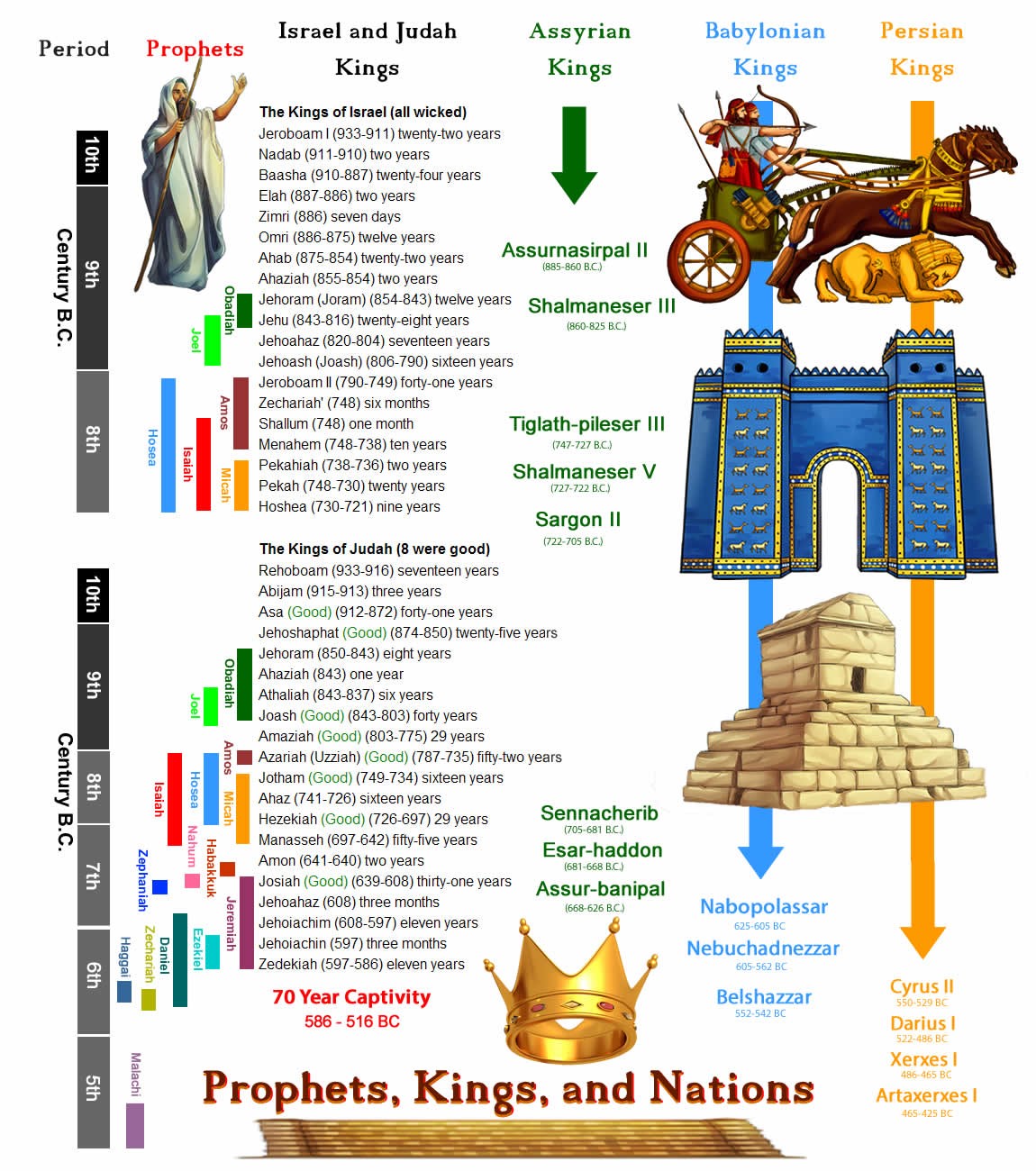
Solomon kept control of Israel because of God's promise to David; however, he lost the protection and favour of God as he backslid. He soon faced new internal and external challenges, including Jeroboam (promised the reign over Israel by the Prophet Ahijah, from Hadad of Edom) who challenged his control in the southern territory of Israel, and from Rezon of Damascus, who threatened his control over the northern territory of Israel.
Solomon died of natural causes in 931 BC at the age of 80, the most prosperous and productive king ever to rule over Israel. His son Rehoboam inherited the throne. The kingdom broke up in 930 BC, with Israel to the North and Judah to the south. Things went downhill quickly, as both nations slid into sin.
For Reflection
- The conversation between God and Gideon in Judges 6 reveals something of the character of Gideon. He lacks faith and confidence to lead the Israelites against the Midianites. Using human reasoning, there is no doubt that Gideon is not up for the challenge and God should have just chosen another person. However, God called Gideon a mighty man of valor (Judges 6:12). God put His confidence in Gideon and that lesson should be more than enough for our lives today.
- Gideon sought God's guidance through "fleeces" (Judges 6:36-40). How do we get an accurate fix on God's guidance in our lives?
- Think about Ruth's commitment to Naomi in terms of your own friendship, marriage or family relationships: "Ruth replied, "Don't urge me to leave you or to turn back from you. Where you go, I will go, and where you stay I will stay. Your people will be my people and your God my God. Where you die, I will die, and there I will be buried. May the LORD deal with me, be it ever so severely, if even death separates you and me." (Ruth 1:16, 17).
- Jacqueline Grey points out at "not all characters in the Old Testament are as noble and good as Ruth. Sometimes characters display both positive and negative qualities. They are, after all, only human like us. We can learn from their mistakes. Other characters are models of behaviour that we would not want to copy. They are ruth-less" (Them, Us and Me, APS Press, Sydney, 2008, p. 114).
- Samuel described David as a man after God's heart (1 Samuel 13:13, 14). A person after God's heart is not perfect, but someone who loves God, sees sin for what it is and repents of it. David did that (Ps. 32, 38, 51). He may justly be termed after God's heart because (unlike Saul) his greatest desire was doing God's will. The more of God he knew, the more he wanted to know. He is an example for us.
- God used a shepherd boy who trusted in Him to save Israel from defeat and slavery; he positioned him at the battlefield for a strategic encounter with Goliath. Think about circumstances in which God has shown Himself strong through your limitations mixed with faith and enabled you to meet giants in your own life. He will guide your steps. Like David, the weapons you have may not seem much to the enemy, but with God you have more than enough to defeat any enemy.
- How can we prevent sin from compromising our faith as it did in ancient Israel?
- Gideon, Saul, David and others were small players at the beginning, but God raised them up and used them - he can use each of us to carry out His will.






